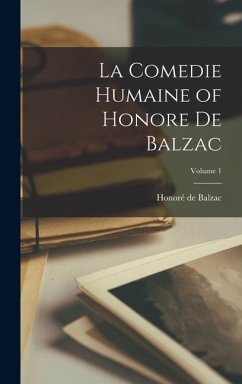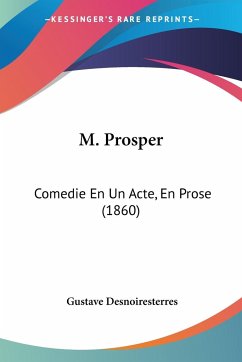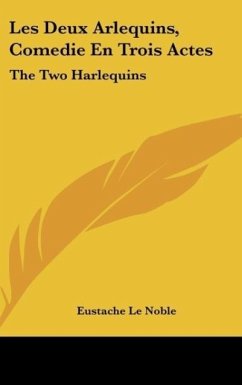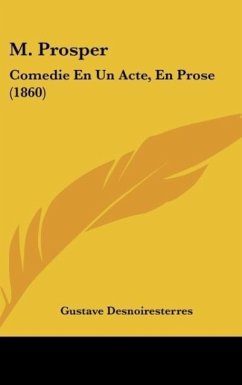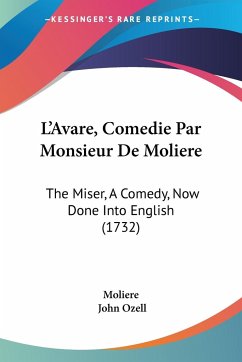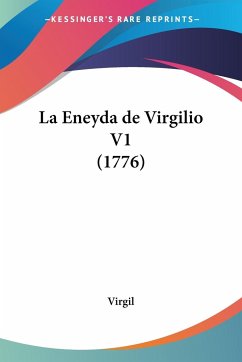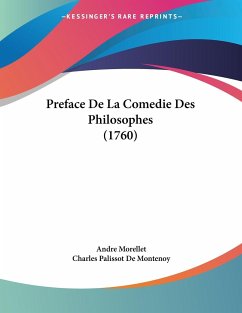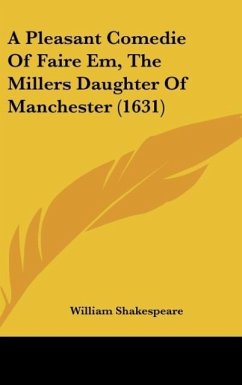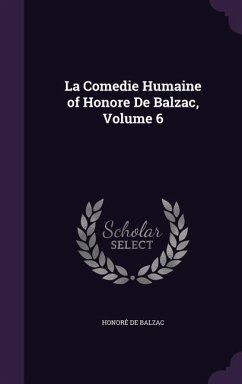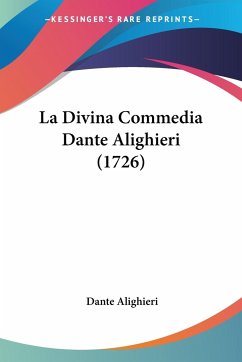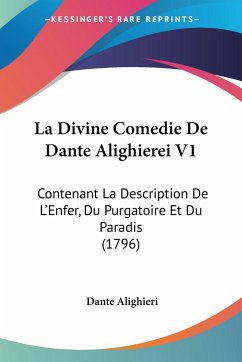
La Divine Comedie De Dante Alighierei V1
Contenant La Description De L'Enfer, Du Purgatoire Et Du Paradis (1796)
Versandkostenfrei!
Versandfertig in 1-2 Wochen
24,99 €
inkl. MwSt.

PAYBACK Punkte
12 °P sammeln!
La Divine Com¿¿¿¿¿die de Dante Alighierei V1 est un livre qui contient la description de l'enfer, du purgatoire et du paradis. ¿¿¿¿¿crit par Dante Alighierei et publi¿¿¿¿¿ pour la premi¿¿¿¿¿re fois en 1796, ce livre est une ¿¿¿¿¿uvre majeure de la litt¿¿¿¿¿rature italienne et europ¿¿¿¿¿enne. Dans ce livre, Dante raconte son voyage ¿¿¿¿¿¿ travers les trois royaumes de l'au-del¿¿¿¿¿¿, ö¿¿¿¿ il rencontre des personnages c¿¿¿¿¿l¿¿¿¿¿bres tels que Virgile, B¿¿¿¿¿atrice et Saint Bernard. La premi¿¿¿¿¿re partie de la Divine Com¿...
La Divine Com¿¿¿¿¿die de Dante Alighierei V1 est un livre qui contient la description de l'enfer, du purgatoire et du paradis. ¿¿¿¿¿crit par Dante Alighierei et publi¿¿¿¿¿ pour la premi¿¿¿¿¿re fois en 1796, ce livre est une ¿¿¿¿¿uvre majeure de la litt¿¿¿¿¿rature italienne et europ¿¿¿¿¿enne. Dans ce livre, Dante raconte son voyage ¿¿¿¿¿¿ travers les trois royaumes de l'au-del¿¿¿¿¿¿, ö¿¿¿¿ il rencontre des personnages c¿¿¿¿¿l¿¿¿¿¿bres tels que Virgile, B¿¿¿¿¿atrice et Saint Bernard. La premi¿¿¿¿¿re partie de la Divine Com¿¿¿¿¿die, intitul¿¿¿¿¿e L'Enfer, d¿¿¿¿¿crit les neuf cercles de l'enfer, chacun r¿¿¿¿¿serv¿¿¿¿¿ ¿¿¿¿¿¿ un type de p¿¿¿¿¿ch¿¿¿¿¿. La deuxi¿¿¿¿¿me partie, Le Purgatoire, d¿¿¿¿¿crit le mont du purgatoire, ö¿¿¿¿ les ¿¿¿¿¿mes sont purifi¿¿¿¿¿es avant d'entrer au paradis. Enfin, la troisi¿¿¿¿¿me partie, Le Paradis, d¿¿¿¿¿crit les neuf sph¿¿¿¿¿res c¿¿¿¿¿lestes, ö¿¿¿¿ les ¿¿¿¿¿mes atteignent la b¿¿¿¿¿atitude ¿¿¿¿¿ternelle. La Divine Com¿¿¿¿¿die est un chef-d'¿¿¿¿¿uvre de la pö¿¿¿¿sie et de la philosophie, et est consid¿¿¿¿¿r¿¿¿¿¿e comme l'une des plus grandes ¿¿¿¿¿uvres de la litt¿¿¿¿¿rature mondiale.This scarce antiquarian book is a facsimile reprint of the old original and may contain some imperfections such as library marks and notations. Because we believe this work is culturally important, we have made it available as part of our commitment for protecting, preserving, and promoting the world's literature in affordable, high quality, modern editions, that are true to their original work.



